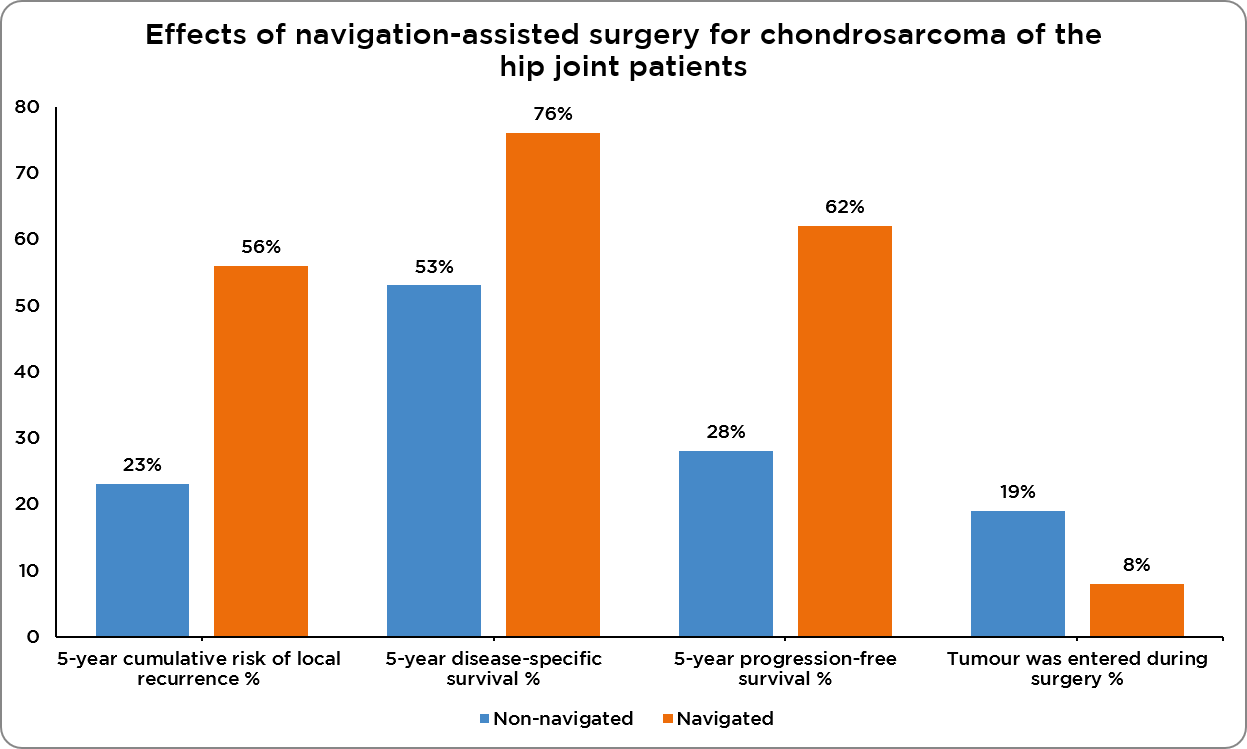Computer navigation-assisted surgery results in dramatic survival improvements for chondrosarcoma patients
Survival in patients with chondrosarcomas has not improved over 40 years. As surgery is the key treatment for chondrosarcoma patients, surgeons at the Royal Orthopaedic Hospital NHS Foundation Trust in Birmingham, set out to investigate if the use of computer navigation to guide surgery, would result in improved outcomes for patients with chondrosarcoma of the pelvis.

In 2010, the Bone Cancer Research Trust funded the initial investigations by Professors Lee Jeys and Robert Grimer at the Royal Orthopaedic Hospital in Birmingham, to assess the efficacy of computer guided pelvic sarcoma surgery- Computer Assisted Sarcoma Surgery Is Safer (CASSIS) Trial. This project laid the foundations and enabled future work to lead to this potentially life-saving discovery.
The team studied 50 patients who underwent limb-sparing surgery for hip joint chondrosarcoma, which was performed with and without navigation assistance, between 2000 and 2015.
The results have confirmed significantly better outcomes in local control and progression-free survival when computer navigation-assisted surgery was performed.

The navigation-guided surgery resulted in improved surgical control, reducing the number of occasions where the tumour was entered at any point during surgery (intralesional resection rates) from 19% seen in non-navigated surgeries to 8% for the navigated surgeries. There were no complications related to the use of navigation and a trend towards better functional outcomes for the navigated procedures.
The 5-year risk of local recurrence was 23% and 56% in the navigated and non-navigated groups, respectively.
The 5-year disease-specific survival (considering chondrosarcoma only as cause of death) was markedly improved from 53% to 76%, when comparing the non-navigated with the navigated groups. In addition, the 5-year progression-free survival (when patients live with the disease, but do not become worse) was also improved notably from 28% to 62% when navigated-surgery was used.
Professor Lee Jeys, Professor of Life and Health Sciences, University of Aston and Consultant Orthopaedic Surgeon at the Royal Orthopaedic Hospital, Birmingham said:
As we currently don’t have an effective chemotherapy or routine radiotherapy option for classical chondrosarcoma of the pelvis, the margins achieved at surgery are really important. We have been using computer navigated surgery in the pelvis for about 10 years and have been able to show that we can get better margins and reduce local recurrence. However, this is the first long term study that shows that doing surgery better with navigation saves lives. The difference is quite massive and if this were a new chemotherapy it would be revolutionary. It is important that we keep on improving on what we do as surgeons to improve patients’ function and if possible, improve their chances of being cured.
I discharged my first navigated pelvic chondrosarcoma patient cancer free at 10 years post-surgery this month and it was a great feeling for both of us! Hopefully many more patients will have a better chance of being cured with this technology!
Dr Victoria Vinader, Research manager, Bone Cancer Research Trust said:
In 2010, the Bone Cancer Research Trust awarded a Pump Priming Grant to Professors Lee Jeys and Robert Grimer at the Royal Orthopaedic Hospital in Birmingham. Their work has now come to fruition and has resulted in amazing survival improvements for chondrosarcoma of the hip joint patients. The success of this research illustrates just how important it is to fund new ideas! The Bone Cancer Research Trust is committed to supporting and championing research that will eventually become a reality, and will directly benefit the lives of primary bone cancer patients and their families.
